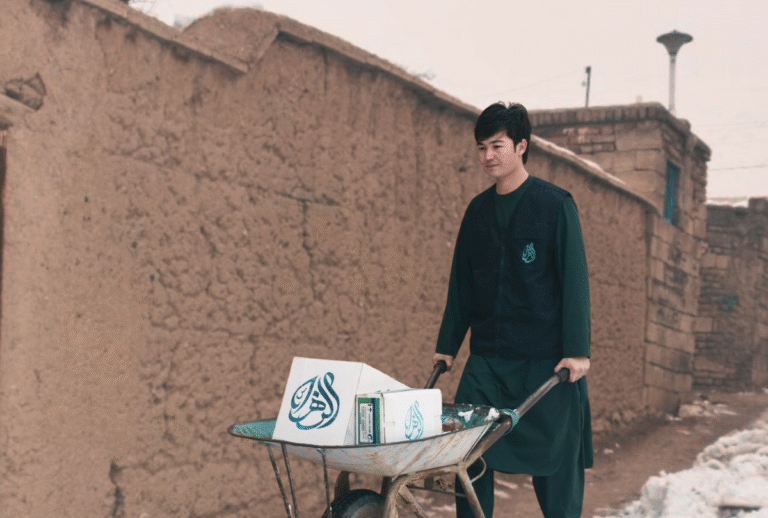What Are 5 Lessons the Ahlulbayt (as) Teach Us About Everyday Life?
The Ahlulbayt (as) showed us what living by Islamic teachings looks like in real life.
They led a simple life, helped quietly, and stood firm in truth even when it cost them everything.
Their lessons are daily choices you can make too:
- How do you choose to speak?
- How do you choose to give?
- How do you choose to forgive?
- How do you choose to stand with others?
Follow these five lessons to lead a life inspired by the Ahlulbayt (as).
1. Generosity: Give from What You Love
Imam Ali (as), Sayyeda Fatima (sa), and their family gave away their food for three consecutive nights to someone in need.
All while fasting each night and going hungry themselves.
Allah (swt) revealed the following verse to honour their act of selflessness:
“They give food, in spite of their love for it, to the needy, the orphan, and the captive, [saying], ‘We feed you only for the sake of Allah.’” (Quran 76:8–9)
Practice: Give something you value most; time, food or wealth, and see how it softens the heart.
2. Compassion: Never Leave a Heart Unseen
The Ahlulbayt (as) never looked away from suffering.
Imam Hussain (as) stood out of compassion for the injustice his tribe faced.
Sayyeda Zainab (sa) spoke truth on behalf of the ummah after Karbala with courage.
Practice: try to notice who’s struggling around you; a neighbour, a friend, a family member.
3. Patience: Stay Steadfast, Even in Silence
Imam Zainul Abideen (as) faced unimaginable injustice, grief, and loss that would break most hearts.
But he (as) chose to turn his pain into patience.
He put his trust in Allah (swt) to bring him and his family justice on the Day of Judgement.
“O you who believe! In moments of distress, seek help through patience and prayers. Surely, Allah is with the patient ones.” (Quran 2:153)
Practice: when frustration rises, pause before reacting and see beyond the moment.
4. Justice: Speak the Truth, Even When It’s Hard
Justice was the foundation of Imam Ali’s (as) leadership.
As a ruler, he (as) refused privilege for himself.
When a Christian man claimed his armour, Imam Ali (as) took the case to court like any other citizen. The judge ruled against him, and he accepted it without anger.
The Jewish man embraced Islam after being moved by Imam Ali’s fairness.
Allah (swt) says in the Holy Quran:
“…Allah loves those who do good to others.” (Quran 5:93)
Justice begins in small places: how you speak, how you deal in business, how you treat those with less.
Practice: Stand up for what’s right in your family, workplace, or community with mercy.
5. Service: Use What You Have to Uplift Others
Every Imam of the Ahlulbayt (as) lived for service.
Imam Hassan (as) was known for feeding the poor and freeing captives.
Imam Hussain (as) gave his life for the preservation of Islam for generations to come.
They taught that serving others is a form of worship.
Practice: volunteer your time, share knowledge, or support someone who is alone.
Why Does This Matters Now?
Many people we interact with everyday are struggling in silence.
A kind word, a shared meal, and a patient response could ease someone’s burden.
When we lead a life inspired by the Ahlulbayt (as), we build a kinder, more just world.
May Allah (swt) help us follow their path and reward every acts of kindness done for His sake.
FAQ
The Ahlulbayt (as), or “People of the House,” are the family of Prophet Muhammad (saww), including Imam Ali (as), Sayyeda Fatima (sa), Imam Hassan (as), Imam Hussain (as), and their descendants.
From the Ahlulbayt (as), we learn practical lessons such as:
- Generosity; giving even in hardship
- Compassion; caring for others with humility
- Patience; enduring trials with trust in Allah
- Justice; standing for truth
- Service; uplifting others through small acts
- Be patient in challenges
- Stand firmly for what’s right
- Help neighbours and family
- Show kindness and mercy in everyday interactions
The Quran encourages believers to give selflessly:
“They give food, despite their love for it, to the needy, the orphan, and the captive…” (Quran 76:8)
The Ahlulbayt (as) gave charity for the sake of Allah (swt) to those in need. You can honour them by supporting families in need through The Zahra Trust.







